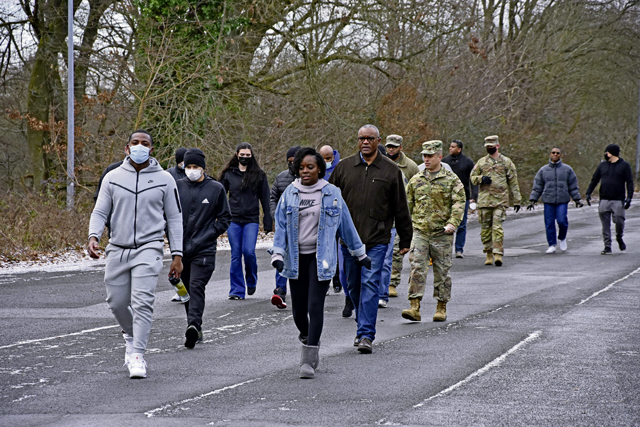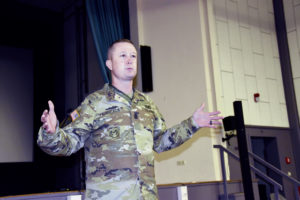U.S. Army NATO Brigade Soldiers and civilian employees commemorated the life of Martin Luther King Jr. at Sembach Kaserne on Jan. 21.
The observance kicked off with a brief speech by the brigade commander, Col. Miles T. Gengler, followed by a one-mile march to honor those who participated in the March on Washington on Aug. 28, 1963, to advocate for civil and economic rights for African-Americans.

“That was a novel experience for me,” said Mark McLeod, brigade chief of staff. I have never been to a Martin Luther King Jr. event that started off with a one-mile march.”
After the march, participants settled into the Tiger Theater with snacks provided by the USO to watch the documentary “The March,” narrated by Denzel Washington in 2013 to highlight the events leading up to and including the historic March on Washington for Jobs and Freedom.

The brigade’s Command Sgt. Maj. Bryan J. Valenzuela wrapped up the event with an impromptu speech thanking the organizing committee of Sgt. 1st Class Jonathan Burney, Sgt. 1st Class Ruben Avila, Staff Sergeant Miles Pierce, Staff Sergeant Daphne Pierre, Sgt. Terrell Harper and Spec. Dameyne Toney.
During his speech Valenzuela tied the current generation to the generations who lived through the civil rights movement.
“Think about the experiences they went through during that critical time and think about everything that lead to the hardship America was facing prior to 1963 that really goes unnoticed,” said Valenzuela. “Think about the people in this room and the organization you are in. We are not predominantly one color, one race, one religion.
“I can talk to you each and every day, but everyone of you in the room is a leader. It takes you young leaders in the room to actually make a difference, to talk to your Soldiers.
“You listening to me is like listening to your grandfather talk or your father telling war stories.
“The way you’re going to make an impact is as a young noncommissioned officer or as a young captain who may be a company commander someday. You have to relay that message to your Soldiers and spread the word of diversity and the message it entails,” said Valenzuela.
Spec. Dameyne Toney said he volunteered to serve on the committee because “observing Martin Luther King Jr. Day is important because it reminds us of our past, represents our historic struggles and inspires future generations to continue to fight.”
U.S. Army NATO Brigade provides support to Soldiers and their families to provide ready and resilient Soldiers to the NATO alliance, maintain our joint and multinational partnerships and enhance the alliance. The brigade is the U.S. Army support element for 44 NATO organizations across 37 locations in 21 countries.







